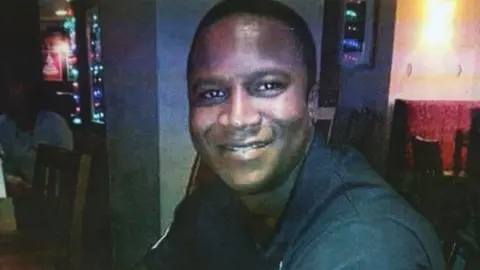Sheku Bayoh inquiry told PCs not trained in tackling suspects 'on drugs'
 BBC
BBCPolice who restrained Sheku Bayoh on the day he died had not received specific training on how to tackle suspects under the influence of drugs, an inquiry has been told.
The 31-year-old died after a violent confrontation with officers in Kirkcaldy in 2015.
He had earlier taken ecstasy and an illegal substance called Alpha-PVP.
Police Scotland's former head of safety training has been giving evidence at the inquiry into Mr Bayoh's death.
The inquiry is investigating the circumstances of his death, how police dealt with the aftermath, the subsequent investigation, and whether race was a factor.
Insp James Young highlighted a series of gaps in the training given to officers at the time.
He told the inquiry an updated training manual was introduced in 2013 for new recruits and serving officers.
Asked about training for incidents involving drink or drugs, Insp Young said: "It was always mentioned as a risk factor, but there was no specific training on either how to communicate or restrain someone under the influence of drugs or alcohol."
The inquiry counsel Angela Grahame KC asked if it was simply left to the discretion of officers.
"I would suggest so, yes," replied Insp Young. "Based on their own knowledge, experience, skill.
"At that time, we relied heavily on people's own interpersonal skills. I never received any training on how to deal with violent individuals, how to de-escalate."
Members of the public had reported that Mr Bayoh had been carrying a knife and behaving erratically before police arrived at the scene.
'Excited delirium'
He was restrained on the ground by six officers, stopped breathing and later died in hospital.
Insp Young said that in 2015, officers were taught how to spot "excited delirium," a drug-induced state now referred to as acute behavioural disturbance.
"We told officers the signs and the symptoms. What we lacked then was being very clear on what the safe management was.
"We didn't talk about contain rather than restrain, where possible.
"We didn't talk about restraint as a last resort and for the shortest time possible."
The training stressed the dangers of positional asphyxia when people were held on the ground.
Officers were taught to be mindful of where they were putting their bodyweight and their hands, and to try to put as little pressure on the chest as possible.
Violent individuals
A police officer since 1995, Inspr Young said on many occasions he had witnessed colleagues lying across the backs of suspects, despite the risks.
"It wasn't particularly uncommon to see officers lying across violent individuals because at times that's potentially the only way they can protect themselves and others."
He added: "Wherever you can, you don't do it."
One of the officers involved in restraining Sheku Bayoh has previously told the inquiry that he held him down by the shoulders and not the chest.
Insp Young also told the inquiry there was "no way of telling" what officers had been told during refresher training around the country.
Some trainers across the force had preferred to use their own techniques because they didn't agree with the methods contained in the 2013 manual.
Changes were made to training in 2016.
The inquiry, before Lord Bracadale, continues.
